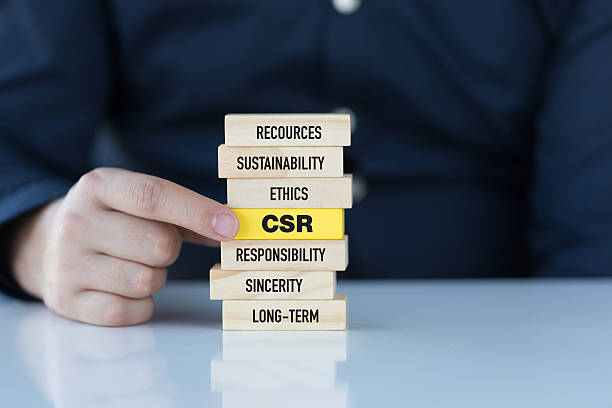- Home >
- Our Ideas
What is Corporate Social Responsibility? 4 Main Types of Corporate Social Responsibility for your Business.

CSR, also called Corporate Citizenship, can help companies understand their impact on society, including but not limited to socio-economic and environmental. While initially thought to be an internal business model, various national and international laws have made CSR a set of initiatives that transcends beyond organizations and industries.
Since CSR directly factors into an organization's reputation, it is essential to align social responsibility practices and integrate them into a business model to succeed. Organizations adopting CSR programs have often seen growth and the capability to 'create shared value.' Efforts like philanthropy, environmental sustainability, and volunteering can help companies build their brand image while benefiting society.
CSR in today’s geopolitical scenarios also sends positive messages of corporate self-regulation. As such, many organizations are now going above and beyond their social responsibilities or law mandates to create holistic CSR models that “appear to further some social good.” To this end, in 2010, the International Organization for Standardization released ISO 26000, a standard that provides guidelines for adopting CSR.
Adopting CSR practices has multiple benefits, including:
Better brand recognition
Greater employee engagement
Improved shareholder and investor relations
Increased sustainability
Mitigation of many socio-environmental risks
Creating an ecosystem of social & environmental accountability
One of the main pillars of corporate social responsibility is environmental accountability. More organizations are now adopting environmentally sustainable strategies. Preserving natural resources through fine-tuning operations and supporting/volunteering for related causes helps companies build their environment-friendly image. The environmental responsibility model also ensures depleting natural resources get recovered and responsibly used.
Organizations often pursue environmental stewardship through the following means:
Decreasing consumption of natural resources
Reducing emissions in the manufacturing process, pollution, and waste
Adopting a better recycling strategy for goods and materials and promoting the same recycle/reuse practices to its customer base
Offering countermeasures to offset negative impacts of natural resource consumption
Adopting sustainable and conscious methods of transmission of goods - select the ones that have the least pollution and emissions impact
Creating more eco-friendly products, i.e., have a lesser impact on mother nature
For example, many car manufacturers are now shying away from the traditional petrol or diesel engines for their vehicles, instead opting for a more sustainable option of electrical motors. Even companies that deplete forests for their processes are pledging to plant saplings to replenish the loss of trees.
Ethical responsibility grows from the continuously evolving need for organizations to operate ethically and fairly while conducting their business. These days external influences exist (including state or federal laws or client demands) that often mandate companies to create and abide by strict ethical standards. Awards and recognition like 'most ethical companies' are big boosters for an organization's image - and they promote a healthy workplace as well. Here are the common practices that businesses adopt as part of their ethical CSR:
Treating every customer fairly, regardless of their age, sexual orientation, race, or culture
Uniform, positive treatment of all employees including abiding by, and exceeding minimum industry standards for pay and benefits
Fair employment consideration for all individuals regardless of age/sex/race
Diversifying vendors and choosing suppliers from varying backgrounds, including but not limited to different races or genders, veterans, or economic statuses
Periodic, honest, and timely disclosure of operating expenses and concerns to investors and other stakeholders
Companies may go above and beyond to maintain better relationships with their investors through these means
Corporate social responsibility is not only limited to being environmentally or ethically conscious. It also propagates the concept of 'creating shared value.' The philanthropic responsibility gears toward defining how an organization contributes to society. In simpler terms, a company's stewardship towards being philanthropically conscious consists of its policies to spend its resources for the greater good.
A company’s philanthropic responsibility consists of the following key factors:
If a company is honest about donating to charities or causes it promotes and supports
Whether the organization only engages with vendors/suppliers who align to the same rigorous ethical and philanthropic standards as theirs
Whether the company follows and supports philanthropic steps for its employees through paid time off or matching contributions
If a company regularly engages in wide-scale philanthropic endeavors like fundraising and social volunteering
Apart from the first three responsibilities for an organization's CSR repertoire, you also have the glue that holds it together - its financial responsibility. While an organization focuses on being environmentally, philanthropically, and ethically conscious, it must also understand financial contributions towards implementing and maintaining these policies. Financial responsibility mandates organizations follow up on their other CSR claims through investing in programs, research, volunteering, or donations.
The popular steps for financial responsibility include:
Research & development for sustainable products
Investing in ethically sourced raw materials
Empower the recruitment process to hire a diverse workforce
Company-wide initiatives like employee training on DEI (Diversity, Equity, and Inclusion), environmental concerns, and social awareness
Transparent disclosure of financial reports to shareholders and external auditors
Sustainable processes that yield greater CSR results (but may be expensive to put into place)
SoulAce is a one-stop solution for all your CSR requirements. With over a decade of experience in the Social Development sector, we are well-equipped with the right teams and software to integrate your SROI reports. We also provide everything else you need to take your CSR project forward successfully. Find all your analytics available at the click of a button with our Technology for Good.